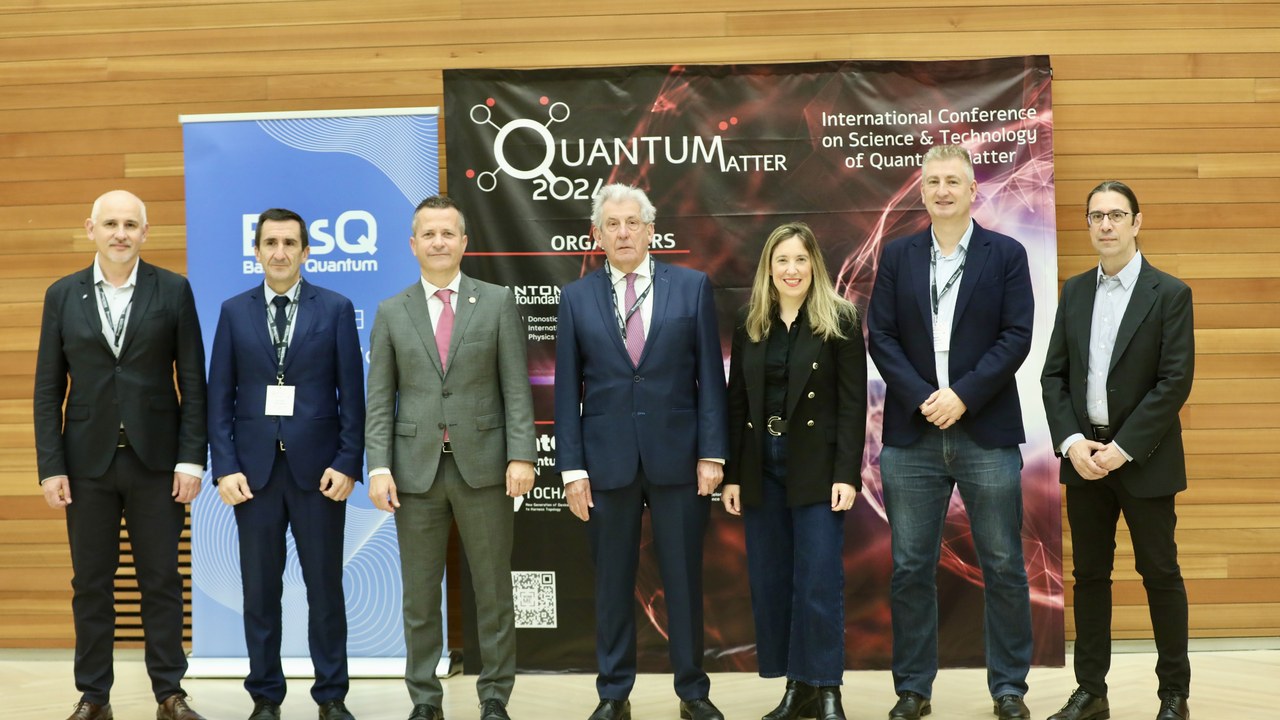QUANTUMatter 2024 kicks off
Donostia is hosting one of Europe’s biggest conferences in the field of quantum technologies. The event organised by the Donostia International Physics Center (DIPC), the Institut Català de Nanociència i Nanotecnologia (ICN2), the Phantoms Foundation, and the National Research Council (CSIC) is bringing together about 600 professionals.

The Basque Government Minister for Education Jokin Bildarratz led the opening ceremony of the Quantum Matter International Conference, QUANTUMatter 2024, one of the biggest conferences in Europe in the field of quantum technologies. Also participating in the ceremony were Ane Insausti, Head of Economic Promotion at the Chartered Provincial Council of Gipuzkoa, Pedro Miguel Etxenike, President of the DIPC and Professor Emeritus of the University of the Basque Country (UPV/EHU), Stephan Roche, ICREA Research Professor of the Institut Català de Nanociència i Nanotecnologia (ICN2) and Antonio Correia, President of the Phantoms Foundation.
In the days to come the Kursaal Auditorium and Conference Centre in Donostia is hosting the fourth edition of the Quantum Matter International Conference, QUANTUMatter 2024, which aims to bring together the various communities involved in the science and technologies of quantum information and quantum matter, two revolutionary components in the field of information processing that are turning into the cornerstones for discovering and applying paradigms in quantum computing and quantum technologies. The event that is congregating 600 professionals in the field has been possible thanks to the joint effort of the Donostia International Physics Center (DIPC), el Institut Català de Nanociència i Nanotecnologia (ICN2), the Phantoms Foundation, and the National Research Council (CSIC).
With its sights on the future, the fourth edition of this conference will help to foster the generation of new ideas and collaboration at the forefront of quantum technologies, emerging materials and new generations of protocols on quantum communication, sensing and simulation. The programme includes sessions on a range of topics, roundtable discussions and almost an entire day devoted to presenting the latest advances in technological developments and business opportunities in the marketing of quantum computing on the so-called Industrial Forum. There will also be a special session devoted to showcasing joint collaborative projects in quantum computing between Basque Quantum-BasQ and IBM.
The conference features a long list of top speakers in the field; they include Ignacio Cirac of the Max Planck Institute for Quantum Optics, Claudia Felser of the Max Planck Institute for Chemical Physics of Solids, Artur Ekert of the University of Oxford, Jay M. Gambetta of IBM, Michelle Simmons of the University of New South Wales, and Leo Kouwenhoven of the Delft University of Technology. During the event they will all be sharing their knowledge, views and latest research.
Worthy of mention is the large number of exhibitors, which this year totals 26 and has the participation of the most important companies in the sector, including IBM-Quantum. The conference is also part of the Basque Government's IKUR and BasQ strategies.
The potential of quantum technologies to influence established industrial sectors or create new industries is huge, as demonstrated by the race towards quantum computers, together with the use of quantum technologies for secure communication, sensing and simulations of the quantum world.
According to the scientific director of the Basque Quantum - BasQ strategy Javier Aizpurua, the Basque Country is positioning itself as a benchmark in research and the generation of talent and innovation in quantum technologies. “The fact that the city of Donostia/San Sebastian is hosting the Quantum Matter 2024 conference is no coincidence. We are getting ready to receive the world's sixth quantum supercomputer, the Quantum System One, deployed by IBM, and we hope that the Basque Country will become a reference pool of highly qualified professionals and a hub for international talent in these technologies,” said Aizpurua.
BasQ is an ambitious transversal strategy led by the Basque Government's Department of Education with the involvement of the three chartered provincial councils; it aims to actively contribute to scientific discovery in various areas of quantum technologies: to drive forward their practical application and accelerate their use and exploitation in various business sectors; and to promote new business opportunities and generate social value.
The quantum technologies being developed across the world are expected to continue to flourish over the next decade and to make their presence increasingly felt in our daily lives.
